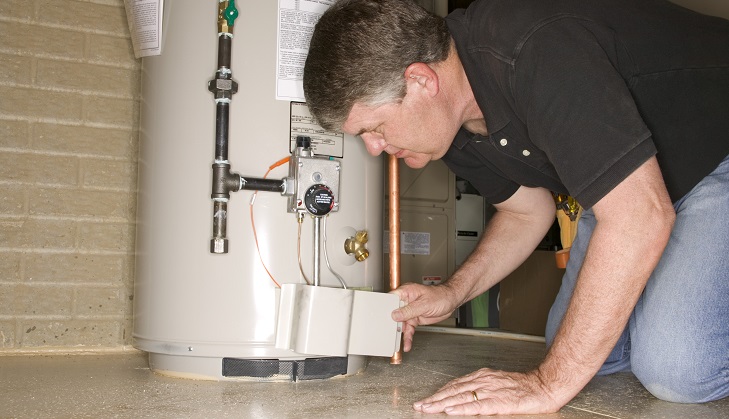
Gas water heaters are a triumph of simplicity in engineering. Without significant energy consumption they can supply showers, faucets and washing machines with all the heated water they need for extended periods of time.
Unlike many household appliances, gas water heaters are relatively easy to “decode” once you know a little bit about them. In other words, after our rundown of your water heater’s anatomy and what to maintain, you should be able to understand how your water heater works, how each part contributes to its functioning and how you can properly maintain unit to make it last for years.
How can routine maintenance help a gas water heater avoid repair needs and extend its lifespan?
Regular maintenance of your gas water heater, especially inspecting and replacing the sacrificial anode and draining sediment, prevents rust and sediment buildup, reducing the likelihood of leaks, clogs, and component failure. This simple upkeep boosts efficiency.
How a Gas Water Heater Works
Here’s a brief description of how your gas water heater works:
When a hot water faucet is turned on in your home, water is transported from the water heater tank to the faucet through the heater’s hot water outlet. To replace what is lost, fresh water is then added to the tank through the cold water inlet, which feeds into the bottom of the tank through a long tube (the dip tube).
Whenever cold water is added to the tank the gas burner underneath the tank is triggered into action, and it will reheat the water until the proper temperature setting has been reached.
There is a control connected to the gas burner that can turn it on and off as needed, so that the preferred water temperature can be maintained at all times.
Simple Gas Water Heater Maintenance Tips

There are two important home maintenance procedures you can perform to help keep your gas water heater in great working order.
Monitor The Sacrificial Anode
First, you can monitor the condition of the sacrificial anode. This is a long rod made of magnesium or aluminum that protects the metal interior of the water tank by rusting away in its place. When two metals are in contact under water the one that is more reactive will corrode down to nothing before the second metal is affected. As long as sacrificial anodes are replaced before all the magnesium or aluminum is corroded, it will prevent the interior of the tank from rusting.
Sacrificial anode maintenance is simple and straightforward. You can remove the anode from the top of the tank, and put it back again, by unscrewing it with a wrench, and if you see it has been rusted away to the point that six inches of its wire core is showing you should buy a replacement right away. You can look online for guidance or ask your plumber for more detailed instructions on how to check and replace your sacrificial anode—but it should be an easy task to perform.
Drain Your Water Heater
Next, you can protect your water heater from the damaging effects of sedimentation by draining it completely with a hose attached to the drain valve, which is located at the bottom of the tank. There are plenty of ‘how to’ guides available on the Internet that can show you the specifics. Draining a water heater can be done without the assistance of a plumber (make sure the power and the water supply are both shut off). How often you will need to drain your water heater depends on how hard your water is (harder water causes faster sedimentation), but in general it is a good idea to do it annually at a minimum. Regular upkeep, like cleaning out dirty HVAC filters, can also go a long way in maintaining household comfort systems.
Keep in mind that a licensed plumber is always the recommended and safe way to properly drain your unit. Likewise, preparing for seasonal changes—such as getting your HVAC ready for monsoons, can protect your equipment from unexpected damage.
By simply maintaining these two components of your gas water heater, you can extend both the efficiency as well as the life of your unit. And just like your water heater, twice yearly HVAC maintenance can dramatically improve performance, reduce energy waste, and help you avoid costly repairs down the road.
Now discover how to increase the efficiency of your heating and cooling system below.
How Gas Water Heater Maintenance Saves on Energy Bills
As the temperature continues to increase in Arizona, we are all looking for easy ways to increase our AC’s efficiency and save money on our utility bill. Check out 3 tips to save money on your HVAC system.

